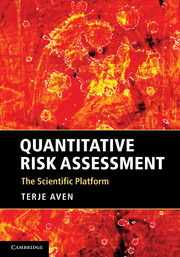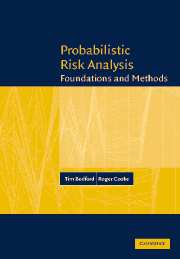Quantitative Risk Assessment
Quantitative risk assessments cannot eliminate risk, nor can they resolve trade-offs. They can, however, guide principled risk management and reduction - if the quality of assessment is high and decision makers understand how to use it. This book builds a unifying scientific framework for discussing and evaluating the quality of risk assessments and whether they are fit for purpose. Uncertainty is a central topic. In practice, uncertainties about inputs are rarely reflected in assessments, with the result that many safety measures are considered unjustified. Other topics include the meaning of a probability, the use of probability models, the use of Bayesian ideas and techniques, and the use of risk assessment in a practical decision-making context. Written for professionals, as well as graduate students and researchers, the book assumes basic probability, statistics and risk assessment methods. Examples make concepts concrete, and three extended case studies show the scientific framework in action.
- A new and original approach to the analysis and discussion of QRA and science
- An accessible and concise exposition from one of the most active researchers in the risk field
- Examples included in the text illustrate the different types of risk assessment
Reviews & endorsements
"This is a timely topic, and a very interesting book. This book provides a scientific underpinning for the concepts and methods of risk analysis, with a theoretical framework and terminology that provide a platform for further analysis and understanding."
Charles K. Davis, Computing Reviews
"The work is short, yet that is its advantage. It concisely presents the material in eight well-written chapters, appended with conclusions (chapter 9) and two appendices that cover theoretical fundamentals (probability, statistical inference, and Bayesian methods) and specific risk terminology. The text provides an extensive bibliography, and is suitable for everyone interested in understanding quantitative risk analysis."
Piotr Cholda, Computing Reviews
"There is no doubt that this is a valuable book for researcher who seek a scientific base and platform for general quantitative risk assessment. I enjoyed reading this book and would recommend it to anyone interested in quantitative risk analysis, including those interested in statistics. To sum up, this is a useful reference book on general quantitative risk assessment. "
Zudi Lu, Mathematical Reviews
Product details
March 2011Adobe eBook Reader
9781139036894
0 pages
0kg
35 b/w illus.
This ISBN is for an eBook version which is distributed on our behalf by a third party.
Table of Contents
- Preface
- 1. Introduction to risk management and risk assessments. Challenges
- 2. Concepts and perspectives on risk
- 3. Science and scientific requirements
- 4. Introduction to case studies
- 5. Risk assessment when the objective is accurate risk estimation
- 6. Risk assessment when the objective is uncertainty descriptions
- 7. Risk management and communication issues
- 8. Towards a holistic approach to risk assessments
- 9. Conclusions
- Appendix A. Introduction to probability theory and statistical analysis
- Appendix B. Terminology
- References
- Index.




